As Brexit places a question mark over foreign labour, sophisticated and flexible machines that can tackle precise tasks are coming to the fore
With Brexit negotiations now under way, the food industry has a limited time to solve one of the looming issues of the UK leaving the EU – labour.
Many in the industry remain optimistic that EU workers, who make up 27% of all food manufacture employees (Office of National Statistics), will be granted permission to stay once the exit process is complete. But the lack of certainty means that, for some businesses, automation is moving up the agenda.
Getting machines to do the work of humans is becoming a more realistic prospect and, in the bakery sector, increasingly sophisticated depositors and extruders are enabling business owners to delegate more tasks to their equipment than ever before. It is now possible to produce complex extruded biscuits with intricate patterns, multicoloured meringues, sponges and icings, and filled bars without any extra labour being required. Using machines can help bakeries get more consistency in their product and, if desired, machines can run 24/7.
“Tasks that were once labour-intensive, such as precise piping, can now be automated,” says Ann Wells, group marketing director of Brook Food Processing Equipment, which supplies a wide selection of machines including the Polin Multidrop depositor range.
Additional features include sheeting (for pizza dough and other large pastry products), wire cutting (for accurately portioning products such as cookies), as well as decorating capabilities.
More sophisticated
These functions are becoming part-and-parcel of machines, says Wells, adding that multi-head depositors have become more sophisticated in recent years, allowing bakers to tap major food trends.
Among such trends has been demand for energy and protein bars, according to Gary Fox, a bakery specialist at Reiser UK, prompting a surge in equipment to produce such items.
This has ranged from “small bakeries looking to tap into this market at a local level, up to the high-output manufacturers,” adds Fox, who works with bakeries from the initial consultation, through to installation as well as looking after the equipment throughout its life-cycle.
“Our customers are constantly looking for new machine concepts and ways to get new products into production, and by utilising our test facility and equipment we have supported numerous products getting to market first,” he says.
Reiser UK supplies Vemag bar extruders that Fox states are good at giving a continuous flow of formed product with consistent thickness and clean, even edges. And they are versatile, he says: “Put two Vemags together with a special attachment and you could produce filled bars.”
The business is also seeing growing demand for gluten-free dough depositing.
“We have small companies using our entry-level Vemag, producing single accurate weight portions, right up to the big players running a number of industrial Vemags with multi-outlet straight-to-pan systems, producing bread, rolls and buns,” Fox says.
“Our industrial Vemag systems are very often bespoke and require our in-house design team’s assistance.”
Sugar reduction targets
Portion size reduction has been flagged up by government agency Public Health England as one way manufacturers and retailers can hit sugar reduction targets, and extruders and depositors can help meet this need.
“With multi-head depositors there is the ability to accurately deposit small portions. This allows ranges to be expanded to include bite-size end products, reducing calorie and sugar intake, but also aiding product range expansion into gift products and bite-size packs,” says Wells.
Production processes must be as flexible as possible, making it vital a depositor can cope with a variety of products and achieve the standards stipulated by customers, says EPP managing director Steve Merritt.
He adds that, for a baker wishing to grow a specialist or niche cookie business who does not require equipment for large-scale industrial production, the Minipan Comby3 can extrude, deposit or wire cut while processing a wide variety of recipes.
It handles 30in x 18in trays and is suitable for production of sponge cakes, choux pastry goods and even meringues, says Merritt.
Meanwhile, Mono Equipment is currently working on finalising the design of its next generation of depositors.
“The latest requirement for multi-coloured products and the need for more and more complex shapes has led us to develop the latest Universal and Universal 3DX, which allow three different mixes to be deposited simultaneously to produce a huge variety of multi-coloured complex products,” says Mono Equipment senior marketing manager Roy Kitley.
Creative options
For independent bakeries, the increasing sophistication of these machines means bakers can be more creative with their products and customise more too.
“Biscuits and shortbread, for example, can be created in the shape of a company logo, local landmark or special shape,” says Wells. “We have also seen increased interest from pet food manufacturers who can create products to appeal to dog owners due to their specific shape.
“It allows the customer to develop increasingly creative products and, with technology advancing and allowing for more features on these machines, this will continue,” she adds.#
Case Study: Nevis Bakery, Fort William
Nevis Bakery was established in 1980 by Archie and Hazel Paterson. In the 37 years since, the business has proven to be successful and now has a manufacturing site for wholesale customers as well as a retail shop.
Nevis Bakery is still very much a family business, with son Paul in charge of production and daughter Hazel responsible for administration.
Customers include Selfridges, which has its own-label product manufactured at Nevis, while the general product range includes slices, shortbread, oatcakes and loaf cakes.
The business bought two Polin Multidrop despositors with the wirecut feature – one a year ago and the second six months ago.
“We produce shortbread in six flavours and these machines really speed up the process,” says Archie. “As well as boosting productivity it means we can supply a wider range of customers, including export customers in Ireland, Canada, China and El Salvador.
The depositors help the bakery tap demand for different flavours and varieties, he adds.
“The range for Selfridges includes chocolate shortbread, stem ginger shortbread, and savoury oatcakes.
“We wanted to offer more product flavours to our customers, and this machine means we can quickly change over from one flavour to another.”
Nevis Bakery may invest in another machine as the business grows in the next year or so.
Case Study: Birds Bakery, Derby
With a chain of 58 retail stores, family-owned business Birds manufactures a lot of rolls, cakes, biscuits and confectionery – the business sells over 11,000 caramel doughnuts each week alone.
The stores are spread across Derbyshire and Nottinghamshire, with many also housing a coffee shop.
Birds uses a Konig Plant depositor, a Mono batter depositor, and a Comas Plant for pastry, explains product quality manager Clive Wormall.
“We use the Konig depositors for dough, which is extruded directly into weights, “he says. “We use it for bread rolls and enriched buns to supply all 58 shops in the business. We use the Mono batter depositor for cake batters, choux pastry and cupcake batters. The Comas Plant is for our pastry tartlet confections.
“We chose the machines for their high capacity and consistency, which allows us to produce and deliver the volumes we need for the business.”
Wormall adds that the use of the equipment is less about tapping trends than it is about consistently delivering what is required in a set period of time, in terms of the size, weight and shape of product.
“At peak times, such as when producing mince pies over Christmas, they deliver what we need them to,” he says.
How depositors developed some new twists
Depositors have come a long way since the 1970s, according to Mono Equipment.
That is when the first rotary feature was introduced, allowing bakers to twist different mixes as they were deposited, creating swirls and whirls.
This was followed in 1995 by a depositor with advanced programming that enabled the user to create intricate designs that replicated the hand movements of the master confectioner, says Mono Equipment senior marketing manager Roy Kitley.
“By 2000 the depositor was further enhanced to provide the additional option of being able to work with hard mixes, enabling wire-cut biscuits and petits fours to be produced also,” he adds.
Touchscreen depositors became available around a decade ago. They “completely revolutionised and simplified the way programmes were created and edited via a colourful touchscreen,
icon-driven interface”, says Kitley. “The Omega Touch, Omega Plus and Omega Plus with Wirecut are still in production today and can be found across the globe.”
The Omega Plus with Wirecut, for example, incorporates a finger frame mechanism to make accurate cuts through hard dough to produce cookies and biscuits.
In response to requests from the smaller patisserie shops, particularly customers in France, Mono launched its first tabletop model, the Epsilon, in 2010, requiring just a one-metre space in which to operate.
“This suits the smaller patisserie manufacturers and means it can be installed almost anywhere as it can be taken through a standard-width doorway,” says Kitley.


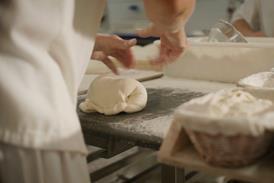

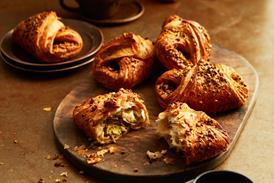
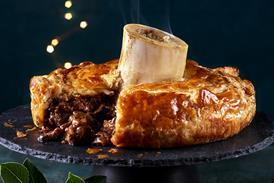
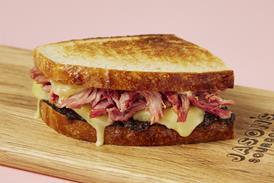


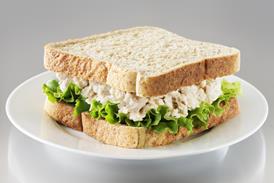




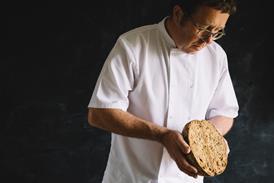
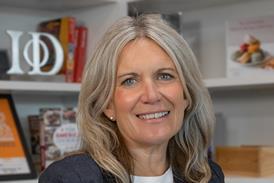


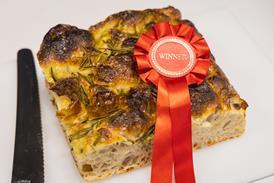
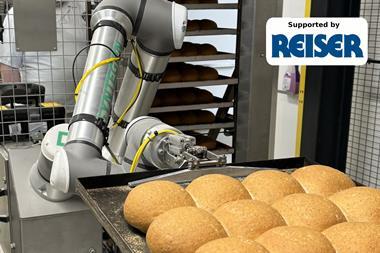
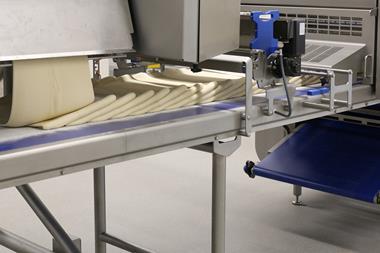
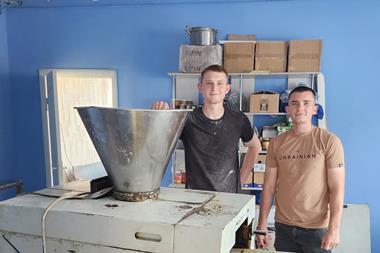
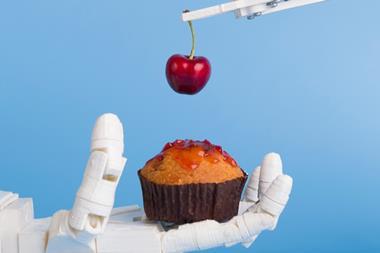

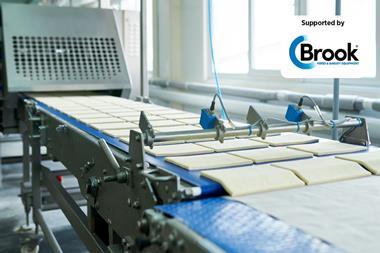

No comments yet